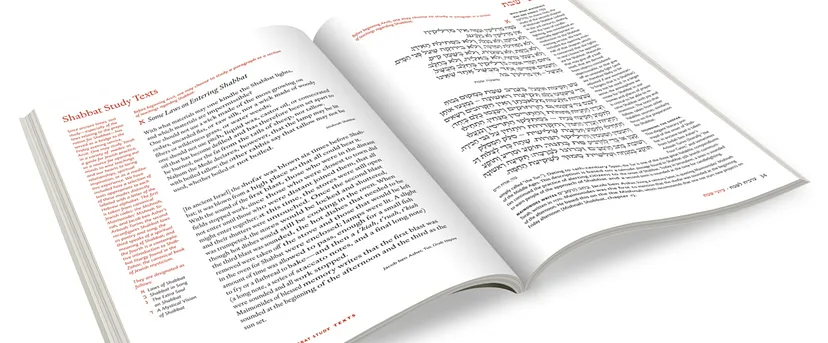Many years ago I was on a student train crossing Western Europe en-route to Eretz Yisrael. After searching unsuccessfully for a deserted spot on the train where I could put on Tefillin and daven, I decided to daven in the small compartment which accommodated 6 people. Before I began, I explained to my compatriots in the berth that I was about to pray, and that they should not be startled at the sight of my phylacteries. I donned the Tefillin on my arm and head, and in due time began to recite the Shmoneh Esrei. Just then the conductor entered asking to see our tickets. With my back towards him, I continued to pray ignoring his attempts to get my attention. Understandably, he was angered by my lack of response, and he started shaking me in order to get me to respond. At this point one of my seatmates, a non-Jew who had seemed somewhat in awe of my Tefiilin, confronted the conductor saying: “Can’t you see this Jew is praying? Leave him be! When he finishes he will find you and give you his ticket”. This, indeed, is what happened.
I always return to this episode in my mind whenever I try to imagine the Torah’s promise from this week’s Parasha that: “The worlds’ nations will see the name of G-d upon you and fear you”, (Devarim 28:10). As Rabbi Eliezer HaGadol explained (Berachot 6a) this Pasuk refers to the Tefillin worn on the head. [The Tosafot suggests that the ‘name of G-d’ referred to here is the name Shin-Daled-Yod which is outwardly visible. The letter Shin is clearly embossed on the side of the Bayit, the letter Daled is situated on the strap circling one’s head (-at the back of the head where the straps are bound together), and together with the letter Yud found in the knot of the Tefillin Shel-Yad, they spell out G-d’s name]. What exactly will the nations fear? Perhaps what the Torah means is that they will be in awe of our devotion and respect us as representatives of Hashem. The HaEmek Davar says : “ When the nations see the high spiritual level of the Jew they will realize that they are not on this level.” The Seforno suggests that this is why Alexander the Great, upon seeing Shimon Hatzadik dressed in Kohen Gadol’d garments, prostrated himself in awe.( Yoma 69:a)
Baruch Hashem, there have been additional moments in my life when I have felt that wearing Tefillin affords one protection. And yet this is not a guarantee we can rely on blindly. Too many times throughout our history, the Tefillin did not afford us protection. Jews have even been murdered while wearing their Tefillin .
Similarly, although the Mezuzah may be Shomer Daltot Yisrael – with the same three letters of the Divine name providing protection for our doors – this does not obviate the need for a good security plan, and 24/7 Shemirah…
[Here too , I have a personal story to share from many years ago: One day I was called in to help with an unusual occurrence in the Mercaz Klita in Beer Sheva. The office had received repeated complaints from the residents of a specific room which was located across the street from an Arab cemetery. For several nights in a row, they were startled by their lights blinking on and off, cabinet doors opening and closing, and the shutters sliding up and down. They had reached the conclusion that the room was haunted and the Olim refused to remain in it. As the Rabbi of the Absorption Center I was asked to come and check the Mezuzah, which the inhabitants claimed was obviously not ‘doing its job’ “protecting” the room. Studying the writing, I quickly ascertained that there were no omissions or spelling mistakes in the words of the mezuzah. However, upon turning the Klaf over, I noticed that there was a problem with the Shin Daled and Yod written on the outside of the Klaf. The three letters were not all there – the Yod was missing, and thus the two letters left spelled the word “Shed”, or demon. After a Sofer added the missing letter, and the Mezuzah was returned to its former place, there were no more reports of any untoward incidents…]
This brings us to a similar promise of divine protection with which the residents of Eretz Yisrael have been blessed.
The Passuk tell us that: “The eyes of Hashem are focused on the Holy Land from the beginning of the year and till the end of the year”. Nonetheless, here too, this promise does not mean that the IDF can in any way lessen their vigilant watch over our borders…
Many rush to claim that the lapse in Divine protection should be attributed to human failing and sin. The Midrash speaks of a king’s son who always would walk close to his father. After some time, the son forsook his father and decided to go off on his own. To the son’s surprise he was attacked by ruffians who had always stayed away for fear of the august majesty of the king. So, too, the Midrash claims, Bnei Yisrael who are protected when they follow the will of Hashem lose their protection when they go against His will.
We have all been moved by the pictures of religious soldiers standing next to their tanks while donning Tallit and Tefillin. This emphasizes what the Rosh says that the Tefillin worn on hands and heads of soldiers guarantees that Moshe’s bracha to the tribe of Gad will come to pass. (Devarim 33:20) :”To Gad he said blessed is the one who helps Gad expand. He dwells like a lion tearing the arm and head of his prey”. On this verse the Targum Yonatan gives his non-literal interpretation.: “They will go out to fight battles against enemies and slay their kings and leaders……”.









